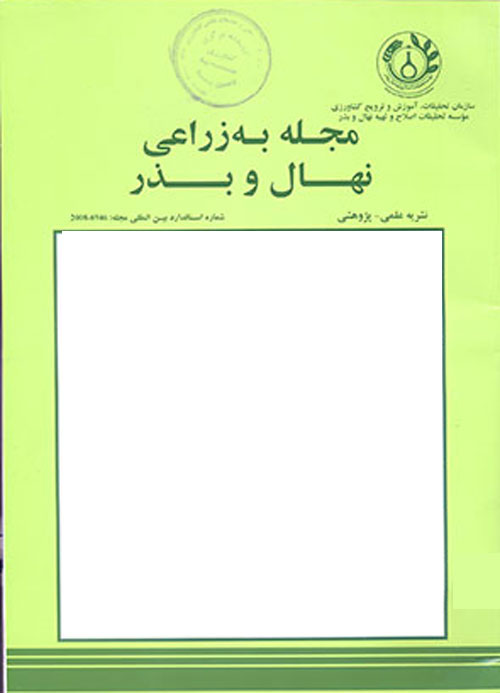Establishment and Proliferation of Two Apricot × Plum Hybrid Rootstocks for In Vitro Culture
Author(s):
Abstract:
This study was carried out to evaluate factors affecting establishment and proliferation of two apricot × plum (Prunus armenica × Prunus domestica) interspecific hybrids; HS405 and HS706. These hybrid rootstocks are resistant to diseases and pathogens and have been developed in East Azarbayjan Agricultural and Natural Resources Research Center, Tabriz, Iran. Propagation of these hybrids through cutting and grafting proved to be difficult due to some physiological disorders. Therefore, vegetative propagation using tissue culture can be a reliable method for mass production of healthy plant materials from these new rootstocks. Nodal explants were surface sterilized by immersion in 70% ethanol for 30 seconds, followed by 2. 5% sodium hypochlorite for 7 and 10 min depending on the tissues, then rinsed three times with sterile distilled water. Cultures were established on MS and WPM media supplemented with BAP (0, 1 and 2 mg/l) + 0.05 mg/l NAA and effects of 3 sampling dates (spring, summer and autumn) were evaluated. After four weeks, surface and internal infection, shoot necrosis, percentages of active buds were recorded and a scoring index system (1- 4) was developed for determination of buds growth quality. WPM medium supplemented with BAP (0, 1, 2 and 4 mg/l) + 0.5 mg/l GA3 was used in proliferation stage and after four weeks number of shoots, average shoot length, shoot quality index, leaf number, leaf length and leaf chlorosis index were recorded.All media were supplemented with 3% (w/v) sucrose and 0.7% agar and the pH was adjusted to 5.7 before agar addition and autoclaving. All the cultures were maintained in growth room at 24±1ºC and 16-h photoperiod under 40 µM m-2 s-1 illumination created by white fluorescent lights. The experiments were set up as factorial in completely randomized design (CRD) with five replications, each containing four explants. Data were analyzed using SAS software and the means were compared by Duncan’s Multiple Range Test at the 5% probability level. In establishment stage the highest percentage of active buds and bud quality index achieved from explants collected in spring. HS405 genotype had higher number of active buds compared to HS706. WPM medium was better than MS in establishment stage. The highest percentage of active buds was achieved in hormone-free medium that without significant difference with the medium containing 2 mg/l BAP + 0.05 mg/l NAA. In proliferation stage, genotype HS706 had higher shoot length and quality index as compared to HS405. The best treatment for shoot proliferation was 4 mg/l BAP + 0.5 mg/l GA3 without significant difference with the medium containing 2 mg/l BAP. In vitro propagation of fruit species particularly interspecific hybrids have many of difficulties. In vitro propagation of two apricot × plum interspecific hybrids, HS405 and HS706 was investigated for the first time, in Iran.
Language:
Persian
Published:
Seed and Plant Production Journal, Volume:25 Issue: 4, 2010
Page:
465
https://magiran.com/p720784


